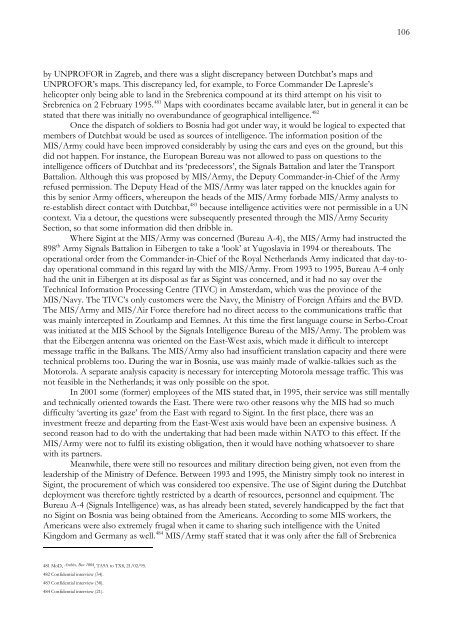C. Wiebes - Intelligence en de oorlog in Bosnië 1992-1995. De rol van de inlichtingen- en veiligheidsdiensten - Engels
C. Wiebes - Intelligence en de oorlog in Bosnië 1992-1995. De rol van de inlichtingen- en veiligheidsdiensten - Engels
C. Wiebes - Intelligence en de oorlog in Bosnië 1992-1995. De rol van de inlichtingen- en veiligheidsdiensten - Engels
- No tags were found...
Create successful ePaper yourself
Turn your PDF publications into a flip-book with our unique Google optimized e-Paper software.
106by UNPROFOR <strong>in</strong> Zagreb, and there was a slight discrepancy betwe<strong>en</strong> Dutchbat’s maps andUNPROFOR’s maps. This discrepancy led, for example, to Force Comman<strong>de</strong>r <strong>De</strong> Lapresle’shelicopter only be<strong>in</strong>g able to land <strong>in</strong> the Srebr<strong>en</strong>ica compound at its third attempt on his visit toSrebr<strong>en</strong>ica on 2 February <strong>1995.</strong> 481 Maps with coord<strong>in</strong>ates became available later, but <strong>in</strong> g<strong>en</strong>eral it can bestated that there was <strong>in</strong>itially no overabundance of geographical <strong>in</strong>tellig<strong>en</strong>ce. 482Once the dispatch of soldiers to Bosnia had got un<strong>de</strong>r way, it would be logical to expected thatmembers of Dutchbat would be used as sources of <strong>in</strong>tellig<strong>en</strong>ce. The <strong>in</strong>formation position of theMIS/Army could have be<strong>en</strong> improved consi<strong>de</strong>rably by us<strong>in</strong>g the ears and eyes on the ground, but thisdid not happ<strong>en</strong>. For <strong>in</strong>stance, the European Bureau was not allowed to pass on questions to the<strong>in</strong>tellig<strong>en</strong>ce officers of Dutchbat and its ‘pre<strong>de</strong>cessors’, the Signals Battalion and later the TransportBattalion. Although this was proposed by MIS/Army, the <strong>De</strong>puty Comman<strong>de</strong>r-<strong>in</strong>-Chief of the Armyrefused permission. The <strong>De</strong>puty Head of the MIS/Army was later rapped on the knuckles aga<strong>in</strong> forthis by s<strong>en</strong>ior Army officers, whereupon the heads of the MIS/Army forba<strong>de</strong> MIS/Army analysts tore-establish direct contact with Dutchbat, 483 because <strong>in</strong>tellig<strong>en</strong>ce activities were not permissible <strong>in</strong> a UNcontext. Via a <strong>de</strong>tour, the questions were subsequ<strong>en</strong>tly pres<strong>en</strong>ted through the MIS/Army SecuritySection, so that some <strong>in</strong>formation did th<strong>en</strong> dribble <strong>in</strong>.Where Sig<strong>in</strong>t at the MIS/Army was concerned (Bureau A-4), the MIS/Army had <strong>in</strong>structed the898 th Army Signals Battalion <strong>in</strong> Eiberg<strong>en</strong> to take a ‘look’ at Yugoslavia <strong>in</strong> 1994 or thereabouts. Theoperational or<strong>de</strong>r from the Comman<strong>de</strong>r-<strong>in</strong>-Chief of the Royal Netherlands Army <strong>in</strong>dicated that day-todayoperational command <strong>in</strong> this regard lay with the MIS/Army. From 1993 to 1995, Bureau A-4 onlyhad the unit <strong>in</strong> Eiberg<strong>en</strong> at its disposal as far as Sig<strong>in</strong>t was concerned, and it had no say over theTechnical Information Process<strong>in</strong>g C<strong>en</strong>tre (TIVC) <strong>in</strong> Amsterdam, which was the prov<strong>in</strong>ce of theMIS/Navy. The TIVC’s only customers were the Navy, the M<strong>in</strong>istry of Foreign Affairs and the BVD.The MIS/Army and MIS/Air Force therefore had no direct access to the communications traffic thatwas ma<strong>in</strong>ly <strong>in</strong>tercepted <strong>in</strong> Zoutkamp and Eemnes. At this time the first language course <strong>in</strong> Serbo-Croatwas <strong>in</strong>itiated at the MIS School by the Signals <strong>Intellig<strong>en</strong>ce</strong> Bureau of the MIS/Army. The problem wasthat the Eiberg<strong>en</strong> ant<strong>en</strong>na was ori<strong>en</strong>ted on the East-West axis, which ma<strong>de</strong> it difficult to <strong>in</strong>terceptmessage traffic <strong>in</strong> the Balkans. The MIS/Army also had <strong>in</strong>suffici<strong>en</strong>t translation capacity and there weretechnical problems too. Dur<strong>in</strong>g the war <strong>in</strong> Bosnia, use was ma<strong>in</strong>ly ma<strong>de</strong> of walkie-talkies such as theMoto<strong>rol</strong>a. A separate analysis capacity is necessary for <strong>in</strong>tercept<strong>in</strong>g Moto<strong>rol</strong>a message traffic. This wasnot feasible <strong>in</strong> the Netherlands; it was only possible on the spot.In 2001 some (former) employees of the MIS stated that, <strong>in</strong> 1995, their service was still m<strong>en</strong>tallyand technically ori<strong>en</strong>ted towards the East. There were two other reasons why the MIS had so muchdifficulty ‘avert<strong>in</strong>g its gaze’ from the East with regard to Sig<strong>in</strong>t. In the first place, there was an<strong>in</strong>vestm<strong>en</strong>t freeze and <strong>de</strong>part<strong>in</strong>g from the East-West axis would have be<strong>en</strong> an exp<strong>en</strong>sive bus<strong>in</strong>ess. Asecond reason had to do with the un<strong>de</strong>rtak<strong>in</strong>g that had be<strong>en</strong> ma<strong>de</strong> with<strong>in</strong> NATO to this effect. If theMIS/Army were not to fulfil its exist<strong>in</strong>g obligation, th<strong>en</strong> it would have noth<strong>in</strong>g whatsoever to sharewith its partners.Meanwhile, there were still no resources and military direction be<strong>in</strong>g giv<strong>en</strong>, not ev<strong>en</strong> from thelea<strong>de</strong>rship of the M<strong>in</strong>istry of <strong>De</strong>f<strong>en</strong>ce. Betwe<strong>en</strong> 1993 and 1995, the M<strong>in</strong>istry simply took no <strong>in</strong>terest <strong>in</strong>Sig<strong>in</strong>t, the procurem<strong>en</strong>t of which was consi<strong>de</strong>red too exp<strong>en</strong>sive. The use of Sig<strong>in</strong>t dur<strong>in</strong>g the Dutchbat<strong>de</strong>ploym<strong>en</strong>t was therefore tightly restricted by a <strong>de</strong>arth of resources, personnel and equipm<strong>en</strong>t. TheBureau A-4 (Signals <strong>Intellig<strong>en</strong>ce</strong>) was, as has already be<strong>en</strong> stated, severely handicapped by the fact thatno Sig<strong>in</strong>t on Bosnia was be<strong>in</strong>g obta<strong>in</strong>ed from the Americans. Accord<strong>in</strong>g to some MIS workers, theAmericans were also extremely frugal wh<strong>en</strong> it came to shar<strong>in</strong>g such <strong>in</strong>tellig<strong>en</strong>ce with the UnitedK<strong>in</strong>gdom and Germany as well. 484 MIS/Army staff stated that it was only after the fall of Srebr<strong>en</strong>ica481 MoD, Archive, Box 1004, TA9A to TX8, 21/02/95.482 Confid<strong>en</strong>tial <strong>in</strong>terview (34).483 Confid<strong>en</strong>tial <strong>in</strong>terview (38).484 Confid<strong>en</strong>tial <strong>in</strong>terview (21).





